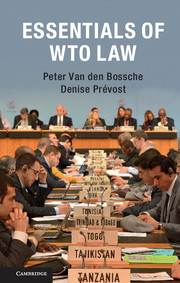Book contents
- Frontmatter
- Contents
- List of figures and tables
- Preface
- List of abbreviations
- Table of cases
- 1 International trade and the law of the WTO
- 2 Rules on non-discrimination
- 3 Rules on market access
- 4 Trade liberalization and other societal values and interests
- 5 Rules on unfair trade
- 6 Rules regarding harmonization of national regulation
- 7 The institutional aspects of the WTO
- 8 The WTO dispute settlement system
- Online resources
- Index
- References
1 - International trade and the law of the WTO
- Frontmatter
- Contents
- List of figures and tables
- Preface
- List of abbreviations
- Table of cases
- 1 International trade and the law of the WTO
- 2 Rules on non-discrimination
- 3 Rules on market access
- 4 Trade liberalization and other societal values and interests
- 5 Rules on unfair trade
- 6 Rules regarding harmonization of national regulation
- 7 The institutional aspects of the WTO
- 8 The WTO dispute settlement system
- Online resources
- Index
- References
Summary
The need for international rules on international trade
The economic prosperity of many countries largely depends on international trade. In the period 2012–2014, for example, 81 per cent of the gross domestic product (GDP) of Zambia, 63 per cent of the GDP of South Africa and 46 per cent of the GDP of Indonesia depended on international trade in goods. The increasing prosperity of China and India is without doubt largely the result of the explosive increase in their exports. There is broad consensus among economists and policy-makers that economic globalization, in general, and international trade, in particular, offer an unprecedented opportunity to stimulate economic development and significantly reduce poverty worldwide.
As UN Secretary General Ban Ki-moon said at the 2014 WTO Public Forum on Why Trade Matters to Everyone:
The question is not whether trade matters, but how we can make trade a better driver of equitable, sustainable development. How can we make trade the foundation of a life of dignity for all?… International trade is an essential component of an integrated effort to end poverty, ensure food security and promote economic growth. An ounce of trade can be worth a pound of aid … Trade can – and should – benefit everyone. That is why the international community needs to avoid protectionism … If managed well, international trade can be a key driver of sustainable development.
However, to ensure that this potential is realized, international trade has to be managed and regulated at the international level. If not, economic globalization and international trade are likely to aggravate economic inequality, social injustice, environmental degradation and cultural homogenization instead of improving the current situation.
Developed as well as developing countries need international rules on trade in order to:
• prevent trade-restrictive measures in situations where they are neither necessary nor desirable yet are imposed due to pressure from well-organized interest groups;
• give security and predictability to traders with regard to the national rules that apply to international trade in their products or services;
• ensure that important societal values and interests, such as public health, the environment, consumer safety, minimum labour standards, economic development and public morals, can be adequately protected and promoted; and
• ensure a greater measure of equity in international economic relations by providing disciplines that bind economically powerful and economically weaker countries alike,
- Type
- Chapter
- Information
- Essentials of WTO Law , pp. 1 - 12Publisher: Cambridge University PressPrint publication year: 2016



